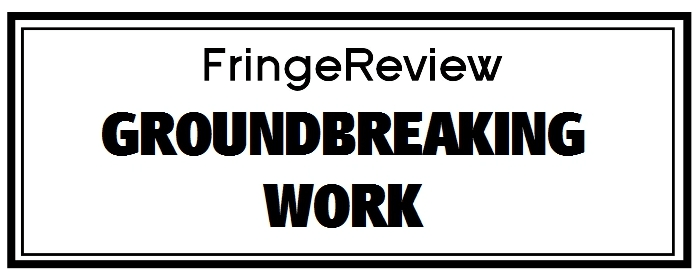FringeReview UK 2019
A History of Water in the Middle East
Royal Court Theatre

Genre: Contemporary, Historical, International, Lecture, Live Music, Mainstream Theatre, New Writing, Political, Short Plays, Storytelling, Theatre
Venue: Royal Court Jerwood Theatre Upstairs
Festival: FringeReview UK
Low Down
Directed by Stef O’Driscoll, with a spare set by Khadija Raza, lit by Prema Mehta and composed by Kareem Samara with Sound Design by Dominic Kennedy. Movement Direction’s by Maria Koripas and Video Designer Charli Davis.
Review
When British-Egyptian Sabrina Mahfouz applied to the Civil Service in 2009 they said she’d be wasted in archives. Be a spy. So the 24-year-old found herself grilled by a suave implacable scion of reformed imperialism. Very hard these spying exams, as Peter Cook might have put it. And more dangerous. A History of Water in the Middle East is a timely ingenious hybrid, worth taking in twice.
Dramatising that vicious little viva is brave for several reasons – and it’s a delicious dish served cold. Mahfouz is frank about her life to 2009, but even that’s not enough for the authorities. So with the help of Laura Hanna, David Mumeni as the trench-coated Spy, and Kareem Samara as composer-instrumentalist on percussion we’re introduced to a double narrative: that interview, a lecture-cum-storyboarding of Britain’s involvement; and of course the music.
Directed by Stef O’Driscoll, there’s a spare set by Khadija Raza taking in black raised platforms and backstage a video mainly of stills like a hallucinatory slide-show, designed by Charli Davis. It’s lit by Prema Mehta and the music from tiny quotations to rave and karaoke opportunities (wait for them!) composed by Kareem Samara. He’s at the back with his drum kit. Sound Design’s by Dominic Kennedy. Movement Direction’s by Maria Koripas.
The clue’s in the title. Who in the Middle East for instance identifies themselves in that Eurocentric bracket? Mahfouz and Hanna alternate as women who grew up in both cultures and thogh they love London, the very stones we sit inside are compromised.
Mahfouz weaves a compelling story of British imperialist interests in everywhere from Bahrain through Egypt Palestine and Jordan, from 1880. There’s maps and neon snapshots, revelations about why say Aden in Yemen was so strategically vital to protect trade with India. And of course what we’re expending on Yemen today in very different hardware. Why indeed everything – as in 2009 – is predicated on British interests, not that of the peoples oppressed by ‘protectorates’.
Most of all this narrative traces like a sinew of water the details of oppression: through water. Water diverted, for instance. Ramalah on the West Bank enjoys more rainfall than London, but Israel takes 80% of it. Saudi, UAE and Israel have the greatest desalination technology in the world, but access to it and its eco-destructive potential has meant alternatives are treasurable but expensive.
The Jordan Valley too has enormous potential but being land-locked in its British creation, can’t access that diverted tributary from Ramallah. The natural benefits from rivers are diverted or sea-coasts allocated unfairly. This starts with us.
It’s the way Britain under the 1915 Sykes-Picot Agreement carved up the Ottoman Empire between Britain and France, that sets faultlines even today. For instance the creation of Iraq – that took in fractured bits of the Turkey-aborted state of Kurdistan (proposed in 1921 by Churchill) – didn’t include a coast. To reward the then ruler of the new Kuwait, a more pliable client, a seaboard and all its benefits were awarded to that new nation, Hence Iraq’s grievance that led to the 1990 invasion. That doesn’t condone but certainly explains a wrong rankling. And current troubles stem from that simple imperialist reward. And of course all the others.
Most memorable though are the sudden vignettes often acted by Hanna. A myth or two and a brief flicker of a 1920 character – we should have heard more of Zakiya – are warm-ups to the cheerful Miriam, a Jordanian plumber of 2050. Discovering that women are far more adept at fixing leaks in an ever-hotter climate where water rules, Miriam’s a privileged person. More than her sexual value she relates, now ‘spanner’ isn’t a synonym for anything but life itself. Miriam’s a literally refreshing boppy and lively creation.
Then Mahfouz (paying herself throughout) conjures her SOAS friend entrepeneurial Amalah (Hanna again) living in UAE now, cheerfully talking of SIS: Shagging in Showers, the only way it can be done with such intolerable heat. People are rated by their ‘shower shaggability’ with no need to wash make up or get dressed, and save water too. The last we see of Amalah is asking Mahfouz some racy intimate details, and we’re faded back – as so often – to the inquisitorial Spy.
Mahfouz wraps the spy narrative snaking up to a shocking karaoke reveal involving memories of her father and the bizarre meld. There’s cuts and variations to the final text but it works beautifully in its 65 minutes.
It’s difficult to say whether the imaginative nubs of Zakiya and the more intriguing Miriam could themselves develop into another play. This one has enough to deal with in its attractive hybrid of spy-interview and lecture. It allows Mahfouz some wonderful swipes and a platform to inform without being accused of preaching in a play.
Though Mahfouz plays down her own abilities, she’s as superbly witty at narration as Hanna is at impersonating characters; both are hypnotically good at harmonizing as they sing: a blend of traditional, pop, and other musics, realised by Samara. Hugely absorbing it’s entertaining too. Mahfouz should go on to write compelling drama out of all this, particularly with her acerbic, imaginative eye for the future.


















































